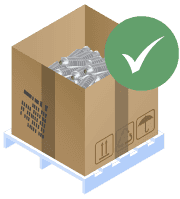Catalytic Converter Price
Are You Getting the Best Price for Your Converters?

Many factors contribute to the value of a recycled catalytic converter, including vehicle maintenance, mileage, and emission laws. However, the primary factor determining the converter's value is the amount of Platinum Group Metals (PGMs) it contains. The value of these metals, namely platinum, palladium, and rhodium, fluctuates based on the market.
So, when it comes to selling your converters, how can companies provide accurate values? Which companies have the most reliable pricing methods? Let's first examine the factors that affect the PGM content in new and recycled converters.
PGM Content in New Converters
When manufacturing a converter, the amount of PGMs loaded into its core depends on the emission laws of the state or country. Stricter emission laws means a higher PGM loading in the converter.
Additionally, the type of vehicle for which the converter is manufactured also affects the amount of platinum, palladium, and rhodium loaded into it. For example, a converter designed for a hybrid vehicle will have a different PGM loading than one made for a truck.
PGM Content in Recycled Converters
A converter’s lifecycle is the most important factor affecting the precious metals that remain once it’s recycled. Factors such as vehicle mileage, maintenance, weather conditions, and more come into play. For instance, higher mileage, improper maintenance, and cold weather result in lower PGM content in the converter.
Also, using the right tools and methods during the dismantling process is essential to prevent any damage to the converter. Cutting or tearing it off affects the ceramic inside and diminishes the PGM content.
It's important to remember that each vehicle has a unique life, which means that even converters with the same serial number might not necessarily have the same value. With this in mind, how do different companies provide information on converter pricing?
Comparing Pricing Apps from Toll Refiners
You might have access to multiple applications that provide prices for recycled catalytic converters, but how do you determine which one is the best? Which one truly reflects the converter's value?
For pricing apps from toll refiners, it's crucial to understand that these companies assay the material they receive. The displayed prices represent the average value of all units with the same serial number that they’ve analyzed.
This means that, when comparing apps from two companies and looking up the same serial numbers, you might notice different prices. For example, Company A may display $250 for serial number 123ABC, while Company B shows $200 for a converter with the same serial number. This doesn’t mean that Company A pays more for that code. In reality, both companies have analyzed multiple units with the same code and provided an average value based on their analysis. Which means that Company A happened to analyze units with higher values, leading to higher prices for certain for that serial number compared to Company B.
It’s a good idea to use pricing apps from more than one company, since they provide valuable and diverse insights that help you make smart buying and selling decisions.
Comparing Pricing Apps from Companies that Buy by the Piece
It's important to remember that companies buying converters by the piece aim to make a profit from the transaction. Their strategy is simple: they pay more for well-known converter units while underpaying for lesser-known units. This strategy is commonly referred to as "loss leaders" in the industry. Essentially, these companies are willing to take a loss on high-visibility units as long as they can underpay for the rest.
You might think you're making more money when you see these companies paying $300 more for the same serial number compared to Companies A and B. However, this strategy is flawed for several reasons.
First, you will realize that your lesser-known converter units are worth much more than what you were paid. Second, if your converter lot only contains well-known units, this buyer will not offer an elevated price for all of them. Remember, they need to make a profit somewhere.
This raises an important question.
How Do They Set Prices for Their Own App/Price List?
In simple terms, these buyers sell to a toll refiner who provides them with pricing information, just like any other supplier. They adapt that information to suit their needs and price points. This brings us to another pricing method.
What Is Across-the-Board Pricing?
Across-the-board pricing occurs when a buyer pays a fixed amount per unit for the entire lot of converters. However, averages obscure crucial information you need to ensure a fair price, such as converter count and material type.
For example, if they price all your units at $120, did they count every unit? Did they group aftermarket units together and consider them as one? Did they offer an across-the-board price based on a single unit? The bottom line is that you're not receiving the true value for your converters with this pricing approach.
The only way to get the actual value of your material is through an assay. That's why all other pricing methods provided by buyers fail to offer an accurate price for all your units.
Why Assay Is the Preferred Method
A catalytic converter is valuable because of the precious metals it contains. Toll refiners are the only companies that can provide an accurate value for your converters because they conduct an assay to determine the precise metal composition.
In simple terms, toll refiners pay you based on your entire load rather than piece by piece. They take samples from your material and analyze it using XRF and ICP technologies. This process allows the toll refiner to determine the precise amounts of platinum, palladium, and rhodium present in your converters. Consequently, you are paid based on the troy ounces recovered from your material and current metal market prices.
By working with a toll refiner, you receive payment based on the true value of your converters rather than someone's best guess.
Which Pricing Method is Best?
Understanding how the company buying your converters determines their prices is crucial. Companies that buy by the piece offer predetermined prices without accurately assessing your material’s true worth. Accepting across-the-board pricing means accepting a value that conceals important information such as counts, material types, fullness, and more.
The only method that provides an accurate price for your material is an assay. So, it’s safe to say that working with a toll refiner is essential to ensure profitability and transparency in your operations.
For more information, please visit PMR's Resource Center.

